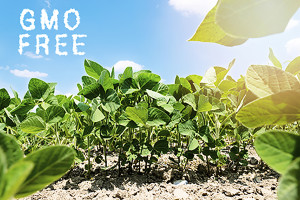Top 10 Non-GMO and Organic Events in 2016

Happy New Year! As we begin the New Year, it’s a good time to look back on significant events related to non-GMO and organic in 2016.
1. The DARK Act becomes law. President Obama signed the controversial Senate Bill 764, aka the DARK (Deny Americans the Right to Know) Act. Instead of clear label statements, the law allows food companies to obscure their use of GMO ingredients by using complex QR codes.
2. Dannon goes non-GMO. The U.S.’s largest yogurt maker made a huge commitment to use non-GMO ingredients in its products, source non-GMO dairy feed, and improve sustainable agriculture for its dairy supply. A few months later, large California dairy producer Clover Stornetta announced a similar non-GMO commitment, and other dairy companies may follow suit.
3. Campbell’s commits to GMO labeling. The soup manufacturer announced it would label its products containing GMOs and support mandatory labeling. It was the first big company to label GMOs and led Mars, General Mills, Kellogg’s, and other big food companies to follow.
4. More Big Food companies go non-GMO. Along with Dannon, Del Monte, Nestlé, Hellmann’s, and others committed to using non-GMO ingredients.
5. Glyphosate controversy. The controversy over glyphosate, the main ingredient in Monsanto’s Roundup herbicide, escalated as the possible cancer-causing herbicide was found in many food products, honey, and people’s bodies.
6. Grain processing giants make non-GMO moves. ADM, Bunge, and Cargill, the ABCs of grain processing, introduced a growing range of non-GMO verified and organic ingredients. Bunge’s corn processing facility in Danville, Illinois—the largest in the world—is now Non-GMO Project verified.
7. Multiple initiatives to increase organic acreage. The U.S. Organic Grain Collaboration, General Mills, Ardent Mills, and Costco led initiatives to increase organic farming acreage in the U.S. Organic farmland topped 4 million acres in 2016, an all-time high.
8. Sonoma County’s GMO ban. Sonoma became the sixth California county to ban plantings of GM crops, creating the largest GMO-free zone in the U.S.—13,734 square miles.
9. Non-GMO Project growth. The growth of the non-GMO market was reflected in the rapid growth of the Non-GMO Project, which has verified more than 40,000 products generating sales of $19.2 billion.
10. Big Biotech to get bigger. The proposed mergers of GMO/pesticide giants Dow and DuPont, Syngenta and ChemChina, and Monsanto and Bayer mean greater monopolies over seed and ag chemicals.
We hope 2017 brings another progressive year for organic and non-GMO foods and a safer, healthier, and more sustainable food supply for the world.




